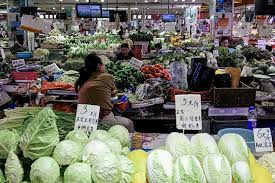
Chinese economic growth among slowest in decades
As officials anxiously watch a possible trade standoff with incoming US President Donald Trump, China's economy grew at one of its slowest rates in decades last year, according to figures released Friday.
In an effort to boost an economy that has been hurting on several fronts, such as a protracted debt problem in the real estate market and weak consumer spending, Beijing has recently launched its most robust assistance measures in years.
However, official data released Friday by Beijing's National Bureau of Statistics indicated that the economy grew 5% last year, which was little higher than the 4.9% predicted by an AFP survey of economists.
Nevertheless, the percentage was less than the 5.2% noted in 2023.
The expansion occurred despite a "complex and difficult environment with increasing external pressures and internal difficulties”, the NBS said.
The economy was still facing “difficulties and challenges”, officials admitted.
Retail sales, a key gauge of consumer sentiment, rose 3.5 per cent — a major slump from the 7.2 per cent growth seen in 2023 — though industrial output increased 5.8 per cent, from 4.6 per cent the previous year.
However, the 5.4 per cent jump in economic growth seen in the final four months far outpaced the five per cent forecast in a Bloomberg survey and was much better than the same period in 2023.
The data provided “mixed messages”, Zhiwei Zhang, president of Pinpoint Asset Management, said.
Beijing’s recent policy shift had “helped the economy to stabilise in (the fourth quarter), but it requires large and persistent policy stimulus to boost economic momentum and sustain the recovery”, he said.
Capital Economics' China analyst, Zichun Huang, predicted that growth will "continue accelerating in the coming months."
"With the rate of declines in home prices slowing and new home sales showing some recovery, it appears that the government's property support measures are offering some relief," she said.
There is trouble ahead.
With the exception of the financially turbulent years of the Covid-19 epidemic, the GDP growth rate is the lowest China has seen since 1990.
Furthermore, according to the analysts AFP polled, growth might decline to just 4.4% in 2025 and possibly below 4% the year after.
Due to debt-ridden local governments slowing growth and stagnant domestic consumption, China has not yet recovered from the pandemic.
In an uncommonly bright area, official data showed earlier this week that exports reached a historic high last year.
However, looming clouds over the nation's enormous trade surplus suggest Beijing would not be able to rely on exports to help its otherwise weak economy.
Next week marks the start of Trump's second term, and he has pledged to impose harsh sanctions on China.
According to Huang, "we still expect growth to slow for 2025 as a whole, with persistent structural imbalances still weighing on the economy and Trump likely to follow through on his tariff threats soon."





